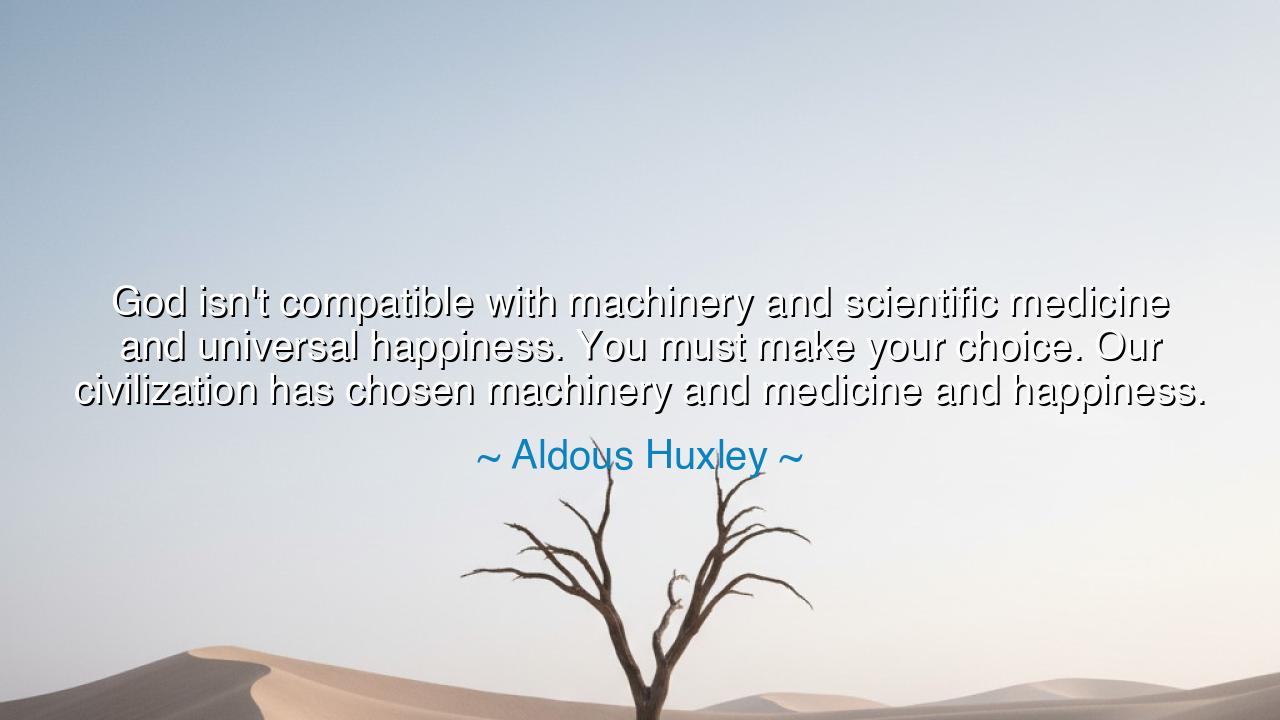
God isn't compatible with machinery and scientific medicine and
God isn't compatible with machinery and scientific medicine and universal happiness. You must make your choice. Our civilization has chosen machinery and medicine and happiness.






“God isn’t compatible with machinery and scientific medicine and universal happiness. You must make your choice. Our civilization has chosen machinery and medicine and happiness.” Thus spoke Aldous Huxley, the seer of modernity, whose vision pierced the glittering veil of progress to glimpse the soul that might be lost beneath it. In this saying, he warns of a profound division in the human heart — the ancient struggle between spirit and science, between the yearning for transcendence and the thirst for comfort. His words come not as condemnation, but as lament — for in mankind’s pursuit of mastery over nature, he saw the slow forgetting of the divine mystery that once gave meaning to all things.
The origin of this quote lies in Huxley’s prophetic novel, Brave New World (1932), a tale set in a future where technology has triumphed over suffering, where medicine prevents disease, and where pleasure replaces pain. In this “perfect” world, mankind has achieved universal happiness — yet at the cost of its soul. Faith, art, love, and grief have all been sacrificed on the altar of comfort. The people live without pain, but also without depth; without sin, but also without redemption. When Huxley writes that “God isn’t compatible with machinery,” he is not rejecting technology itself, but warning that when machines replace mystery, when science supplants the sacred, man risks losing the very essence that makes him human — his capacity for wonder, for awe, for longing.
For God, in Huxley’s meaning, does not dwell in perfection or control, but in the spaces of imperfection — in the suffering that refines the spirit, in the yearning that leads the soul beyond itself. The divine speaks not through circuits and chemicals, but through silence, through beauty, through the ache of the heart that seeks something more than ease. To choose machinery and medicine and happiness, as civilization has done, is to choose mastery over mystery, comfort over contemplation. And yet, Huxley knew, this happiness is fragile, for it lacks the foundation of meaning that only the sacred can provide.
History has shown us this tension time and again. Consider the age of the Industrial Revolution, when machines began to rule the rhythms of human life. The world grew wealthier, cities rose, and diseases began to fade. Yet amid this progress, many felt a strange emptiness — a loss of connection to the land, to the spirit, to one another. The poet William Blake called the new factories “dark satanic mills,” not because he hated invention, but because he saw how the soul of man could be crushed beneath the wheel of progress. Like Huxley after him, Blake understood that when man worships his own creations, he forgets his Creator.
And yet, Huxley’s quote is not merely a rejection of science. It is a plea for balance — for the remembrance that wisdom must walk beside knowledge. Machines may heal the body, but they cannot heal the heart. Medicine may extend life, but it cannot tell us what life is for. Technology may bring us pleasure, but only spirit can give us peace. The danger Huxley foresaw was not in the rise of machines, but in the decline of reverence — that subtle death of wonder that comes when man believes he has nothing left to learn from the stars or from his own soul.
To live in the modern world is to dwell within this paradox. We hold in our hands the miracles of progress that ancient prophets could scarcely dream of, yet our hearts hunger still for meaning. The wise man, therefore, does not reject the gifts of science and medicine, but remembers that they are tools, not gods. He honors the body, but nourishes the spirit. He seeks happiness, but not at the price of truth. For God and machinery, though seemingly at odds, need not be enemies — so long as man remembers which one he serves.
So, dear listener, learn from Huxley’s warning. Do not surrender your soul to the hum of the machine or the false peace of convenience. Let technology serve you, but let the spirit guide you. Make time for silence in a world of noise, for reverence in an age of reason. Remember that happiness without meaning is a shadow, and progress without purpose is a path that leads nowhere. Choose not between God and progress, but let progress be sanctified by gratitude and humility.
For the highest civilization is not the one that builds the tallest towers or cures every disease, but the one that remembers why it builds, and for whom it heals. As Huxley teaches, it is not enough to be comfortable — one must be awake. Let mankind, then, learn once more to balance the power of his hands with the wisdom of his heart, that the light of the divine may dwell once more alongside the brilliance of his invention.






AAdministratorAdministrator
Welcome, honored guests. Please leave a comment, we will respond soon